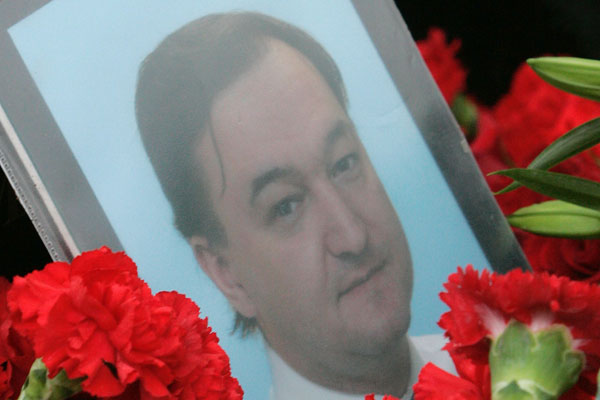Sergei Magnitsky. Photo: PhotoXpress/ZumaPress/Newscom
The Russian government is set to posthumously try the brutally murdered whistleblower Sergei Magnitsky for tax fraud.
While working for Hermitage Capital, formerly one of Russia’s largest foreign investment firms, Magnitsky uncovered a massive fraud and accused Russian police and tax officials of embezzling $230 million from the Russian treasury. For the “crime” of holding his own government accountable, Magnitsky was jailed, tortured, denied medical care, and finally beaten to death in his prison cell.
The trial would have begun on Monday, but Magnitsky’s family and lawyers have boycotted this travesty of justice. Amnesty International calls Magnitsky’s upcoming posthumous trial “Kafkaesque,” “farcical,” and a “dangerous precedent.” It appears that the Russian government will once again abuse the courts to attack the opposition and discredit the U.S. law named after Magnitsky, which Congress passed last December.
Magnitsky was the last in a long line of Russian whistleblowers and political opponents who died or were put in jail. His case is unique, however, because Congress passed the Magnitsky Act in his honor. The law levies financial sanctions and U.S. travel restrictions on the officials implicated in his death and other human rights abuses.
The trial will further serve Russian President Vladimir Putin’s domestic interests as well. Journalists Anna Politkovskaya and Yuri Shchekochikhin, Magnitsky himself, and other victims shared the common bond of criticizing the government and subsequently dying under mysterious circumstances. Mikhail Khodorkovsky, the Yukos oil company founder who dared to oppose Putin, had his assets expropriated and may spend 11 years in jail—if he is released as planned by 2014.
Magnitsky is the first one to be tried posthumously, showing Putin’s resolve to give no quarter to Russian whistleblowers and opposition. The Russian government has responded to the Magnitskky Act with a ban on American adoptions of Russian orphans, interruption of U.S. meat and poultry imports to Russia, and fresh anti-American attacks. Magnitsky’s trial is another link in a long chain.
Russian officials announced that there will be “zero tolerance” to U.S. intervention in “internal Russian affairs,” conveniently forgetting that the 1975 Helsinki Accords internationalized human rights of the Organization for Security and Cooperation in Europe members, which include both the U.S. and Russia.
The Russian government is sparing no effort to taint Magnitsky’s whistleblower legacy and to discredit the Magnitsky Act. Despite the findings of the Russian Presidential Human Rights Council, which last year accused the prison authorities of torture and murder, the Russian prosecutors trampled on Magnitsky’s memory in December when they dismissed the case against the only prison official prosecuted in Magnitsky’s torture and death case.
At the World Economic Forum in Davos, Switzerland, Prime Minister Dmitry Medvedev called Magnitsky a “corporate lawyer or accountant” and not a “truth seeker.” Even if this was true, which it is not, the circumstances do not allow or justify a particularly brutal torture and murder.
If (or more likely when) Magnitsky is posthumously convicted, Russia hopes that it will undermine the legitimacy of the Magnitsky Act, which is aimed to preserve and honor his legacy as a whistleblower against corruption.
To protest the recent crackdown and express its outrage, this past week the U.S. has quit the Joint Presidential Commission on Civil Society with Russia. This is long overdue and was the least Washington could do. As civil society and human rights are rapidly eroding in Russia, and as the real culprits aren’t on trial, the new Obama Administration foreign policy team must re-evaluate its Russian policy, finally putting the “reset” to rest.
Source material can be found at this site.










